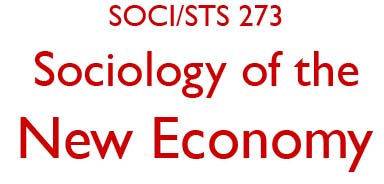
Description
What is the new economy? In one sense, it is a very old concern of sociology. Since the discipline's 19th century origins, sociologists have studied how changes in material production and economic relations affect the ways that people live, work, understand their lives, and relate to one another. Yet since at least the 1980s, sociological interest in the new economy centers upon something new: a flexible, "just in time" mode of industry made possible by information technologies and related social innovations. The logic of this new economy, as well as its consequences for society, are the subjects of this course.
We will use two modes of analysis in this course. The first is conventionally sociological, as we examine the changing values, social structures, and supporting institutions that emerge in the wake of the new economy. Over the last few decades, community, family, race, gender, education, and consumerism have affected work and business in ways that earlier scholars could not anticipate. In turn, the new economy has dramatically transformed these social relations, giving them new freedoms and opportunities but also new risks and inequalities.
Our second mode of analysis is apparently economic, as we investigate how the new economy is driven by technological and social innovations like global outsourcing, information technology, the creative class, and consumer research. However, these economic forces have tremendous sociological relevance, since they highlight changes in how we obey authority, cooperate and compete with others, and accept the social reality that is presented to us.